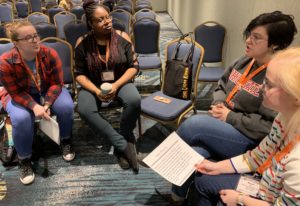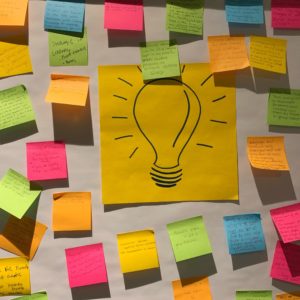Last week at the Creating Change Conference, Family Equality teamed up with COLAGE to share best practices in creating inclusive schools for LGBTQ+ families.
Jean Azar Tanguay (COLAGE Youth Action Board Member), Kaley Fry (COLAGE National Program Director), and Emily McGranachan (Family Equality Council Director of Family Engagement) all shared from their experiences and expertise in finding solutions to help schools support queerspawn, children of LGBTQ+ parents.

Participants in the Creating Inclusive Schools Panel
In high school, as a part of a Girl Scouts project, Jean conducted research on how students are feeling in school. In interviewing over 121 students, Jean found that many felt frustration with phrases such as “bring this to mom and dad,” or forms with things like “mom’s name” or “dad’s name.”
McGranachan echoed this sentiment, sharing her experiences with the FAFSA, and school forms throughout the span of her formal education.
“When it felt like my family wasn’t made for this form, it felt like I wasn’t made for this space — and that’s exclusion,” McGranachan shared.
Jean’s research suggested that many students want teachers and administrators to normalize LGBTQ+ families and students more in their language, activities, and forms. According to the 2011 census, there are over 6 million children and adults who have an LGBTQIA+ caregiver.

Collaborative Idea Board from the Creating Inclusive Schools Panel.
The facilitators broke participants out in groups to generate a list of best practices for schools to become more inclusive.
The lists of resources generated coincide with Family Equality’s toolkit on Creating Safe & Inclusive Schools. The toolkit addresses how LGBTQ+ parents and guardians can play a key role in creating safe and inclusive spaces in their school environments.
The toolkit reminds everyone that schools can fall anywhere along a continuum of LGBTQ+-inclusivity, from having a strong anti-LGBTQ+ climate to being very inclusive and welcoming. Regardless of where schools are along this continuum, there is often still work to be done to ensure that LGBTQ+ families, as well as LGBTQ+ youth and staff, feel completely safe, welcome, and included.
Download the toolkit now for more information.
